Sep 4, 2017 | Science and Art
By Merlijn Twaalfhoven, composer, musician, entrepreneur, and member of the Alpbach-Laxenburg Group, which held its annual retreat last week on the sidelines of the European Forum Alpbach 2017 Political Forum.
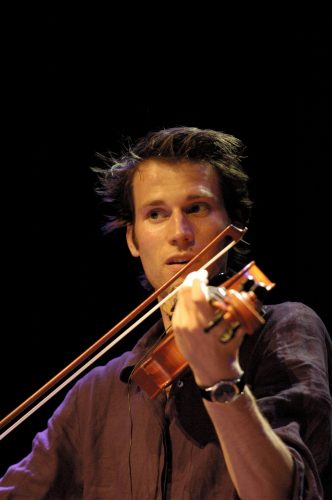
Merlijn Twaalfhoven ©Merijn van der Vliet
Imagine you bring a group of people together, ask them to sit down, give them a drink and then pose the following question: how can we enact transformative social change towards enhanced sustainability and equity?
What would be the looks on their faces? Who would speak up? Last week, I happened to be present in such a group. We sat down, had a glass of water and started. None of us hesitated. We all brought our statements, relevant experience, passionate insights. Those with the task to structure the exchange begged us to find constraint, and called for more digestible sizes of our contributions.
It’s one of the most exciting places on Earth at the end of August: The Alpbach-Laxenberg Group brings scientists, politicians, business leaders, and other experts together for three days of deep conversations about today’s most urgent challenges. It was a tremendous privilege to travel to this beautiful mountain village, join these wonderful people and discuss the future of our planet.
We could hardly breathe. Our conversations tumbled over each other, from the future of computer technology to publication frenzy in academia, from ecological farming in Egypt to outreach of art in Brussels. I could see the pieces of world’s jigsaw coming together. It became apparent that we have the knowledge, the insights, and the technology that’s needed for a sustainable world. We might even find investments, governmental support, or access to the most influential circles at the WTO or the UN. We felt how currents of knowledge start to flow when all these wires connect.
But on way back to the lowlands, the mountains slowly disappearing in my train window, I felt ambivalent.
Did we discuss the right questions? I saw so much strength. Strong voices, strong ideas. Hard data, clear evidence. But we almost drowned in ideas, visions, and possibilities.
The question that we did not pose was: what is our weakness? We are comfortable with wicked problems, global strategies, and impactful solutions. But can we perceive our own frailty? Do we have a sense of the limitations of our knowledge?
A mountain village is the best place to take a breath. To inhale fresh air. I’m afraid we exhaled too much. It was no doubt valuable emanation. We couldn’t stop giving answers. But we missed the opportunity to find better questions. I had the feeling we gathered as experts to play Jeopardy! against computer Watson. We battled to answer any question.
But is this our most effective role? Who has more influence: the person giving an answer or he or she who can formulate the question? In posing questions lies our ability to connect knowledge to curiosity. Any good story will have a captivating query at its base. Only when we can make a strong case for sustainability, can we mobilize our society to become involved.
When a child is missing, the whole village wakes up to search. When will our global village wake up and unite to fight for a sustainability revolution? What might be the most activating murder case that can bind us and make us embark on a heroic quest?
Last days in Alpbach, it was like musicians joining together. We unpacked our instruments and tuned our strings. It was a wonderful sound indeed. We resonated. But this was not yet the performance. The audience is waiting – distracted by their smartphones – until the moment we start truly playing together and deliver a story that’s tremendous, enchanting and mesmerizing.
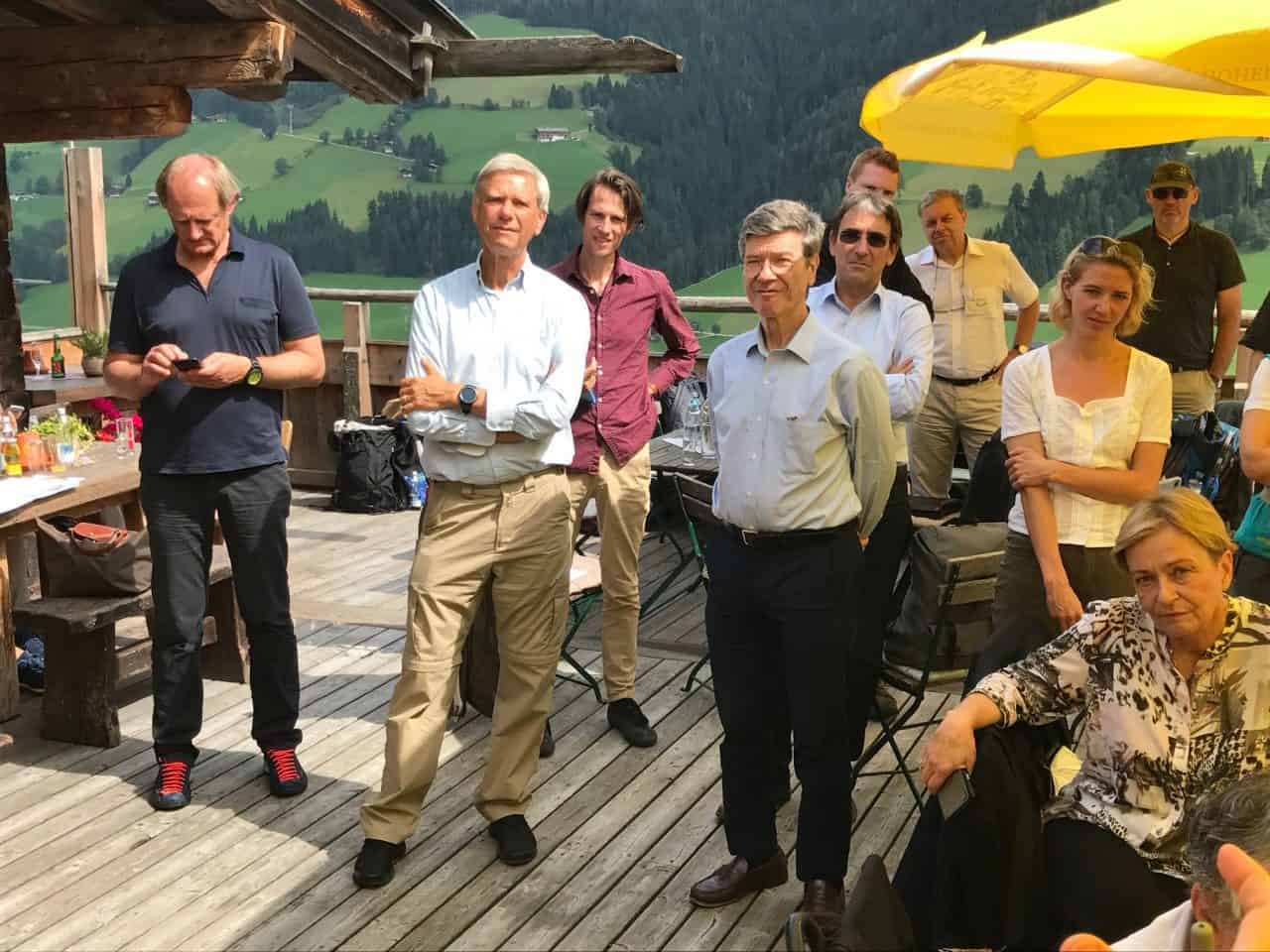
Alpbach-Laxenburg Group members debating on Monday 28 August, 2017. From left to right: Hermann Hauser, Partner at Amadeus Capital Partners Ltd., Jeff Sachs, Director of The Earth Institute at Columbia University and IIASA Distinguished Visiting Fellow, Merlijn Twaalfhoven Composer and Cultural Entrepreneur, Amsterdam, Gloria Benedikt, dancer, choreographer, and Associate for Science and Arts at IIASA, and Milena ´ic Fuchs, Faculty of Philosophy, University of Zagreb; former Minister of Science and Technology of Croatia. © Patrick Zadrobilek | IIASA
Merlijn Twaalfhoven
Composer, musician, enterpreneur.
UNESCO prize (2011).
Working on What Art Can Do – a collection inspiring examples of the work of artists around 17 Sustainable Development Goals.
http://merlijntwaalfhoven.com
http://whatartcando.org
https://twitter.com/Merlijn12H
This article gives the views of the author, and not the position of the Nexus blog, nor of the International Institute for Applied Systems Analysis.
Aug 25, 2017 | IIASA Network, Sustainable Development
Johanna Mair is a professor of Organization, Strategy and Leadership at the Hertie School of Governance, Academic Editor of Stanford Social Innovation Review, Co-Director of the Global Innovation for Impact Lab at the Stanford Center on Philanthropy and Civil Society, and Academic Co-Director Social Innovation and Change Initiative at the Harvard Kennedy School. Mair is also a member of the Alpbach-Laxenburg Group, which holds its annual retreat this weekend on the sidelines of the European Forum Alpbach.
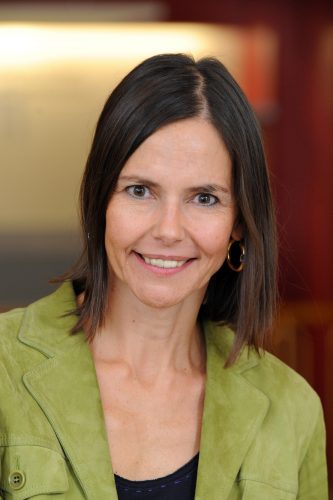
Johanna Mair ©Hertie School of Governance
At the Alpbach-Laxenburg Group retreat this weekend, you will be joining a discussion on governance and institutional transformation towards sustainability. What do you see as the biggest barriers to sustainable development?
Sustainability challenges typically require a concerted effort to achieve impact. We still lack the appropriate governance and accountability mechanisms that ensure implementation of well-intended strategies and commonly devised goals.
As an expert in social entrepreneurship and innovation, what new developments have you seen that you think could drive a transformation towards sustainability? Could you give examples of successful innovations that have taken hold?
We do see innovation on many fronts. Especially in governance technology has enabled a number of useful and helpful innovations that allow for more transparent and accountable processes. At the same time we still face enormous challenges that cannot be fixed by technology and require us to face deeply rooted relational and cultural problems. The prevalence of open defecation and lack of sanitary infrastructure in India is just one example.
Sometimes it seems like there are many great ideas, but adoption is slow. What do you think is necessary to make the leap from innovative idea to widespread practice?
“Most new ideas are bad ideas” as Jim March from Stanford University would say. We must stop praising innovation and start to think and act on linking innovation and scaling as two distinct process to create impact. Innovation is an investment and creates the potential for impact. Scaling enacts and grows this potential and transforms innovation into tangible outcomes – improving the lives of marginalized people and communities and making progress on stubborn societal and environmental problems.
We have elaborated on this in our new book on “Innovation and Scaling for Impact – How Successful Social Enterprises Do It,” which I co-wrote with Christian Seelos.
How do innovation and governance go together? What are the challenges and opportunities for bringing new ideas into institutions and governments?
Governance needs to exert an enabling role. We need to craft and design governance systems that foster innovation. At the same time, governance systems need also make sure that the potential and usefulness of innovation can be tested along the way. This requires reflecting on markers of success that are process and not outcome focused.
The Alpbach-Laxenburg Group brings together leaders from business, and young entrepreneurs, along with government leaders and science experts. What do you think can be gained from a meeting of this type?
The most important outcome will be a shared understanding of priorities, pathways, and markers of success for this journey.
This article gives the views of the author, and not the position of the Nexus blog, nor of the International Institute for Applied Systems Analysis.
More information
IIASA at the European Forum Alpbach 2017 and Alpbach-Laxenburg Group Retreat: 27-29 August 2017
Johanna Mair appearances at Alpbach: 19 August – 1 September
Sep 28, 2016 | IIASA Network
By Daniel McMurray, BA LLB MIL Global Event Lead – Impact Hub, Managing Director & Global Head of Communications – Enterprise IQ Pty Ltd
“It is paradoxical, yet true, to say, that the more we know, the more ignorant we become in the absolute sense, for it is only through enlightenment that we become conscious of our limitations. Precisely one of the most gratifying results of intellectual evolution is the continuous opening up of new and greater prospects”.
– Nikola Tesla
It is hard not to feel that we live at a pivotal moment in history, with the world racing toward an epochal crossroad.
In one direction lies the path of reason, science, community and progress. A world where growing systemic challenges like climate change, resource scarcity, overpopulation, inequality, and environmental degradation can be addressed through logic, evidence, and rational, creative, and collaborative action. Where the ingenuity, collective genius, and relentless optimism of humanity can resolve complex problems such as poverty, disease, and ecological collapse, creating abundance of energy, health, education and well-being for all.
In the other direction, lies a different path. One of regression, unreason, and parochialism. A fact-free, fearful and frightening world of separation, science denialism, and superstition, ruled over by demagogues offering glib, unworkable solutions, convenient scapegoats to blame, and soothing illusory retreat into fragmented tribal realms.
Which path we collectively choose to follow will determine the trajectory of the 21st century and beyond. Will we choose the enlightened path of working together collectively, collaboratively, and consciously for the greater good? Or will we choose the path of darkness, disintegrating into unconscious, unreasonable and irrational behavior that hastens systemic collapse?
At such a pivotal moment, the choice of “New Enlightenment” as the theme for the recent European Forum Alpbach was a timely, prescient and crucial framing.
Attending the forum with my European-based colleagues from Impact Hub – a globally connected network of social entrepreneurs, innovators, and change-makers as official partners for the event – inspired hope that the path of enlightenment, reason and collaborative action is fundamentally achievable.
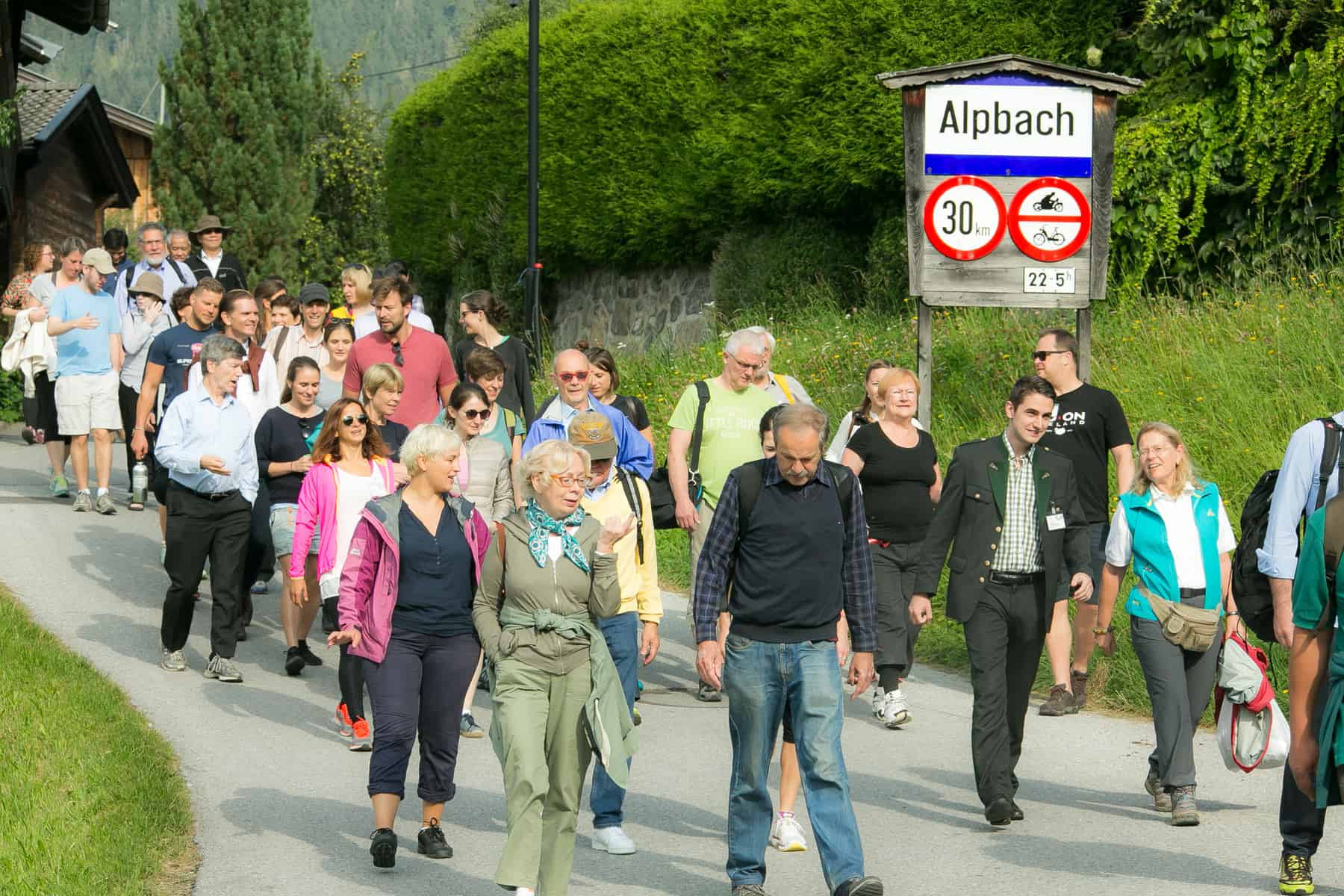
Members of the Alpbach Laxenburg Group and Impact Hub hike in Alpbach, Austria in August 2016. © Matthias Silveri | IIASA
One of the highlights of the event for our contingent was a facilitated hike into the Tyrolean alps with Pavel Kabat (Director General & CEO of IIASA) and other key thought leaders from the Alpbach Laxenburg Group – including Jeffrey Sachs (Director of The Earth Institute from Columbia University), Tarja Halonen (the former President of Finland), Björn Stigson (former President of the WBCSD), Justin Yifu L in (Director of the Centre for New Structural Economics at Peking University), Pascal Lamy (former Director-General of the WTO), and many more cross-sectoral leaders from business, government, NGOs and civil society.
Gathered together in the scenic environs of the Boglalm Chalet, this diverse and eclectic group focused our discussion around how we can work together to achieve the Sustainable Development Goals.
Professor Sachs’ definition of an “entrepreneur” struck a chord. He described entrepreneurs as those with the vision to take elements from diverse sources, creatively combining and re- combining in new ways, key insights from different sectors, research fields, technologies, or existing systems to present a new solution or way of thinking.
In that group, representing a mix of the established elite and the challengers of tomorrow, the old and the new from business, government, science, social enterprise, and civil society, it was refreshing to feel the positive energy and inspired thinking that can come from embracing and making space for an open, cross -pollination of ideas.
It brought to mind a universal truth – that humanity is at its best when we work together collaboratively, breaking down barriers, dissolving silos of thought and entrenched interests and, like Professor Sachs’ concept of real entrepreneurship, combining ideas in new, innovative and creative ways. The path of enlightenment is not the domain of any one group. Political leaders can’t fix things alone – lacking the power, methodologies, community currency, and instruments required. They need business leaders, scientists, innovators, and change-agents from the social sector and civil society to bridge the gaps in dialogue, bring fresh insights and recombine them in radically new ways.
As Albert Einstein famously said, “We cannot solve our problems with the same level of thinking that created them”. The path of enlightenment can only be reached through collaborative action. It is a conscious choice and one that we must come together to choose in order to avert catastrophe.
“Really, the only thing that makes sense is to strive for greater collective enlightenment”.
Elon Musk
Note: This article gives the views of the author, and not the position of the Nexus blog, nor of the International Institute for Applied Systems Analysis.
Aug 30, 2016 | Sustainable Development
Michael Perkinson is the chief of staff to the chief investment officer at the asset management firm Guggenheim Partners in the US. On 28 and 29 August he took part in a meeting of the Alpbach-Laxenburg Group, focused on new models for sustainable business development, and on 30 August he spoke at the European Forum Alpbach Political Symposium.
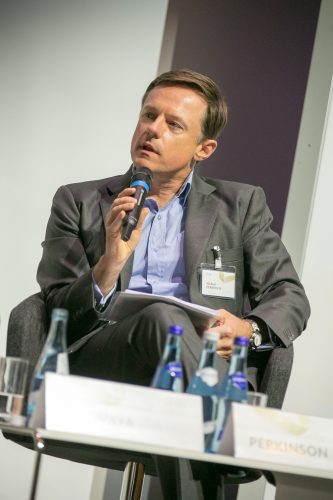
Michael Perkinson speaks at the European Forum Alpbach. ©Matthias Silveri | IIASA
As a business leader with a background in international relations, you have unique experience in both government and the private sector: How do you think that the two could work together towards achieving the sustainable development goals?
Traditionally, the two sectors have not mixed well. Governments were skeptical of the private sector’s profit motives and the private sector believed government was an impediment. Both views were, of course, short-sighted. In recent years the United Nations has looked to the private sector to help finance development as the traditional levels of fiscal policy have been removed from the toolkit by increasingly narrowly focused legislatures. Similarly, private investors and private enterprise, who make up over 60% of GDP in the developed world, realize that they can partner with governments to achieve their social goals. Yes, businesses now have social goals.
What do you see as the biggest challenge is in achieving the SDGs?
Money and willpower.
What changes would be needed in business in order to fully embrace the SDG agenda?
I suspect that businesses need to understand how they can contribute. If given the option of a regulation or a tax, businesses will always chose a tax, because it allows them to plan accordingly. So, in this case, I think businesses require an explanation as to how they can contribute and how it won’t interfere with their executing on their business plan.
Business is often seen as “part of the problem” when it comes to issues like climate change and poverty – do you think that sustainable development could also bring opportunity for business, and if so, how?
Having been in the public sector for 25 years before returning to the private sector, I have never seen the private sector as part of the problem. In the United States, the private sector contributes some 80% of GDP. The private sector also provides jobs, which is really the only way that poverty can be eliminated on a generational scale. I think that there is ample opportunity for business to contribute to the SDGs, but the public sector needs to explain clearly how businesses can contribute in a way that doesn’t interfere with their business plan. It doesn’t mean that businesses need an inducement (like a tax break), they just need to understand the strategic logic of the concept.
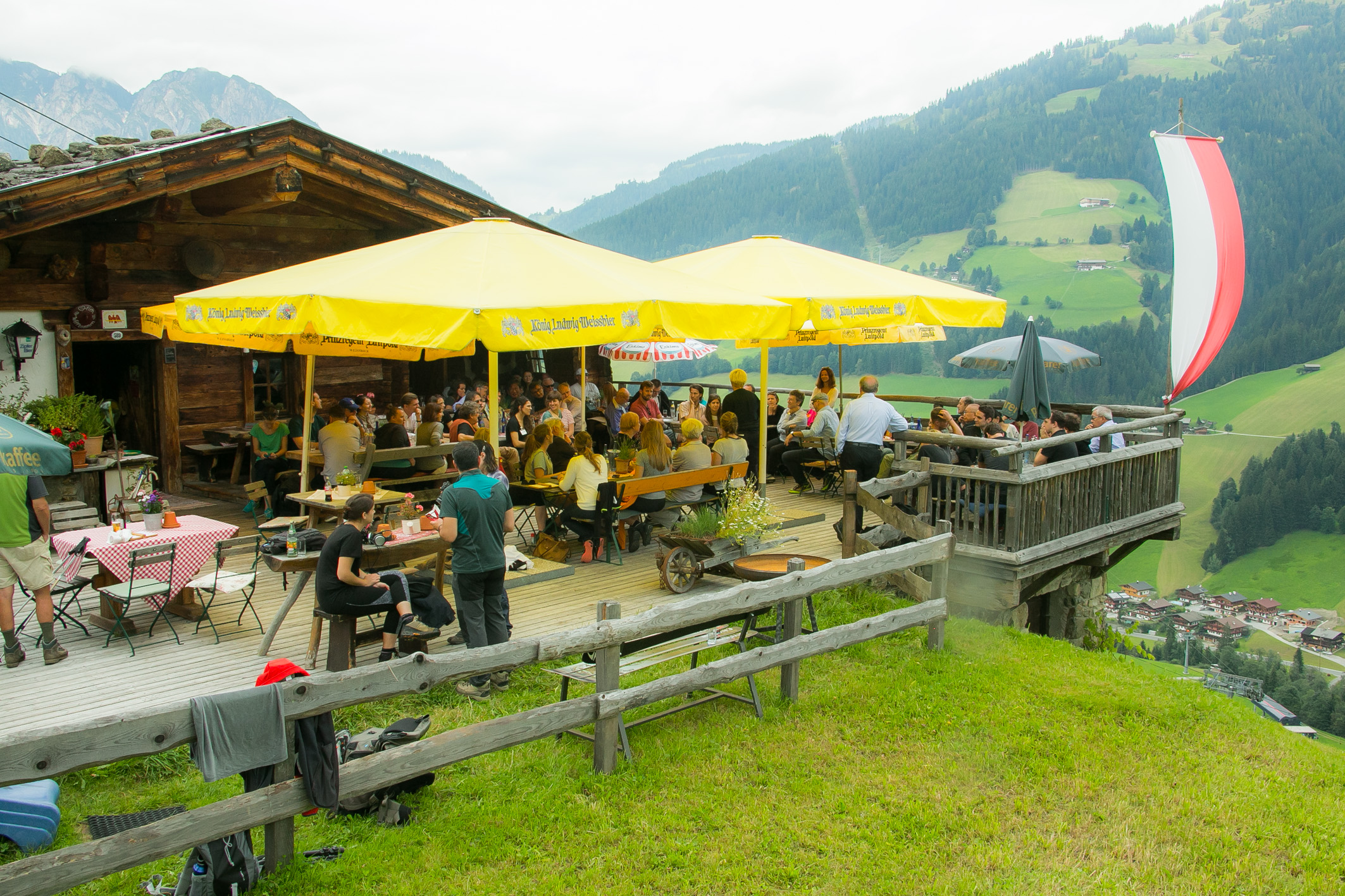
Meeting of the Alpbach-Laxenburg Group, 29 August 2016. ©Matthias Silveri | IIASA
Interview conducted and edited by Katherine Leitzell, IIASA science writer and press officer
Note: This article gives the views of the interviewee, and not the position of the Nexus blog, nor of the International Institute for Applied Systems Analysis.
Aug 29, 2016 | Sustainable Development
Pascal Lamy was the director general of the World Trade Organization from 2005 to 2013, and currently serves as a president emeritus of the Notre Europe – Jacques Delors Institute. On 28 and 29 August he is taking part in a meeting of the Alpbach-Laxenburg Group, focused on new models for sustainable business development.
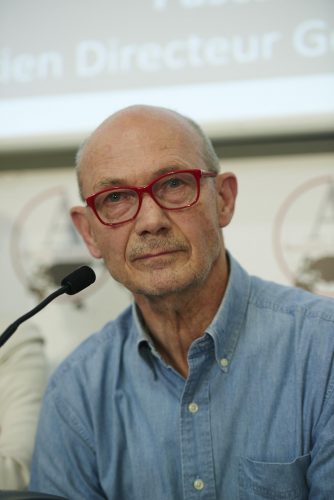
Pascal Lamy ©The Jacques Delors Institute
As the former director general of the WTO, you have extensive experience in global trade and economic development. How does this background inform your perspective on the issues of the sustainable development?
To put it very simply, there is a very well-understood interaction between trade and growth, starting in the 18th century until now. The understanding of the relationship between global trade and sustainable development, i.e. including the environment dimension, is much more recent, understandably because environmental issues only came into the picture much more recently than the 18th century.
The reality is today that the communities working on trade and environmental issues are rather poorly connected. You belong either to one or to the other. There are not that many people who have feet on both sides, which does not help because the issue is complex.
In theory it’s very simple. Take climate change for instance: If you put the carbon price at the proper level, i.e. the one that takes into account the externalities of climate change and CO2 emissions, all you have to do is price CO2 properly, and problem is solved: markets will reallocate production factors accordingly. That’s what theory tells us. The little problem is actually agreeing on a set price for the entire planet. And this triggers a lot of suboptimal propositions, solutions.
I think that the overall stance now is that that trade is not an end. Trade is a means to improve growth in climate, welfare, sustainability, including environment sustainability. This was in fact part of the WTO charter from 1994. When I was DG of the WTO we did quite a lot of work in collaboration with environmental international organizations such as UNEP for instance. We looked into the big question on this topic: Is the expansion of trade good or bad for the environment? There are arguments on both sides, and it is a vast set of issues. But overall I think there are ways and means to reconcile, to synergize the benefits of trade opening for a more environmentally sustainable world.
What do you see as the biggest challenge in achieving the Sustainable Development Goals?
It’s a very long and vast set of issues. So it’s not a single thing—what you have to address issues on inequality, on education, on oceans, on poverty—it’s a lot of different things.
But overall, I think the biggest challenge—and this is why a number of us are working on that—is to properly organize the accountability of these SDGs. That means providing proper metrics, proper review, proper debate, and proper public accountability. Now that the goals have been agreed by the UN, the issue is whether or not they can be achieved, and whether we can properly organize public pressure on sovereign nation states, through civil society, involvement of businesses. So in my view the main issue is building and agreeing on a proper follow up transparency system.
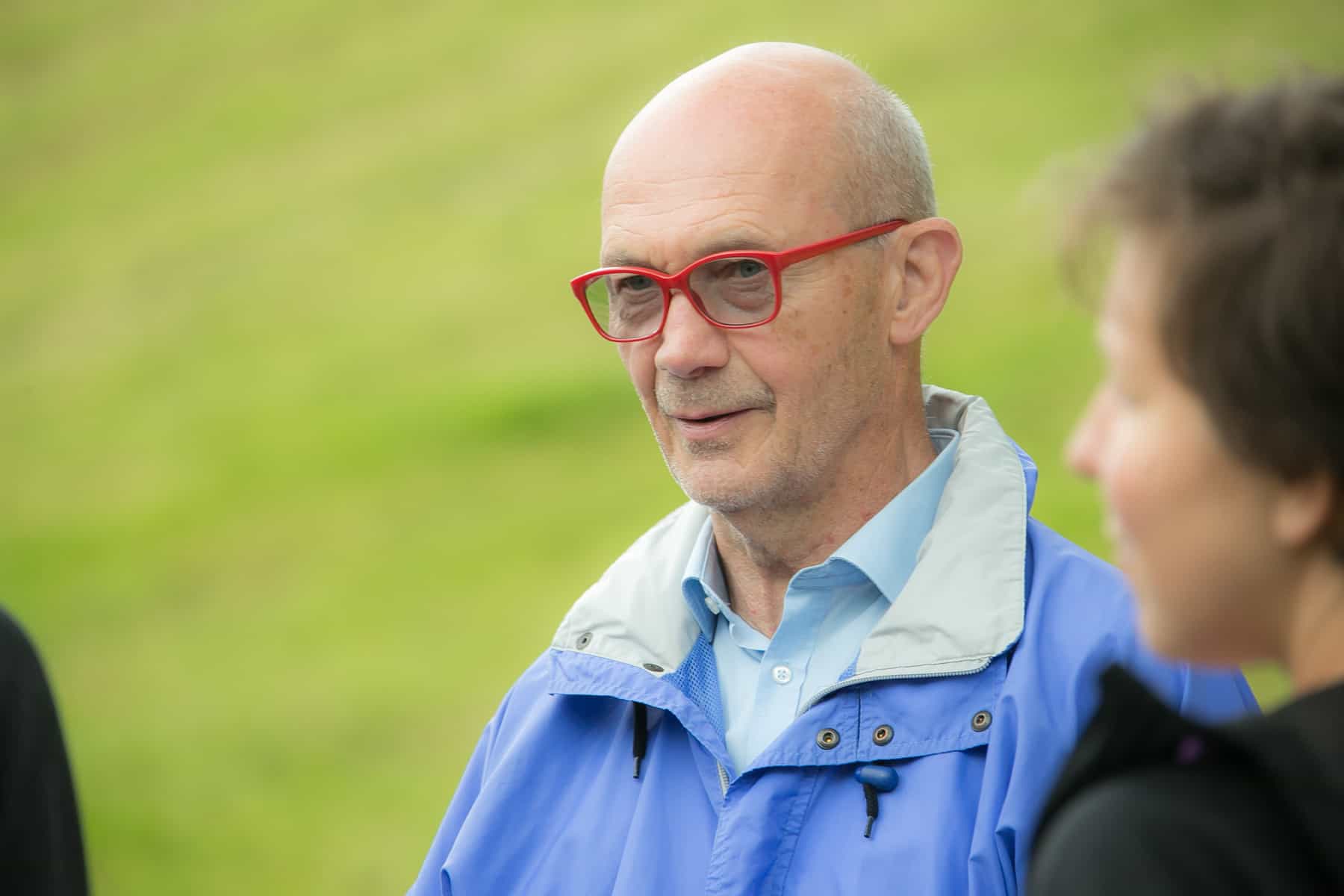
Pascal Lamy talks with other members of the Alpbach-Laxenburg Group at a retreat on 29 August. ©Matthias Silveri | IIASA
How do you think that the private sector could help in achieving the SDGs?
In doing what private businesses have been doing increasingly, which is integrating this sustainable development focus into their global strategies. Most big businesses now have a set of principles, a set of values that include sustainability.
What’s happening for instance around the push towards green finance, notably since the COP21 in Paris, is a good example of how some businesses can be on the front line of a larger coalition. We need coalitions like this to bind public authorities at the national, regional, and city levels, to civil society organizations focused on sustainability, climate, environment, biodiversity, and development, and businesses, whether big or small.
So from your perspective it sounds like business is already on the right track. What further changes would be needed in the private sector in order to fully embrace the SDG agenda?
It will happen if and when businesses realize that it matters to their consumers, to their staff, and to their shareholders, or their finance providers more generally. This is the frame within which they have to optimize what they do—clients, consumers, their people, and where they get their financial resources from. And if these various sides of the triangle push in that direction, inevitably businesses will push in this direction. They’ll have to.
The Alpbach-Laxenburg Group brings together leaders from business, and young entrepreneurs, along with government leaders and science experts. What do you think can be gained from a meeting of this type?
What’s unusual is that it links you with people whom you may not meet every day, so it’s an occasion of diversity connecting on a topic. Plus, there is something which tends to come out of this sort of environment, which is innovation. People exchanging ideas, not just theoretically, “What should we do?” “Where are we?” “Where are we going?” but, “This is what I suggest to do,” “This is what I tried and it worked,” and “This is what I tried and it didn’t work.” It’s more about experiences on the ground, which may then inspire more general conclusions.
Further reading
Pascal Lamy (2016). “Négociations climatiques et négociations commerciales : antinomie évidente ?“. Speech delivered at the 24th Meeting about Risk Management, AMRAE, at Lille, France, February 5th 2016. Download speech (PDF)
Pascal Lamy (2013). The Geneva Consensus: Making trade work for all. Cambridge University Press http://www.cambridge.org/ao/academic/subjects/law/international-trade-law/geneva-consensus-making-trade-work-all
Interview conducted and edited by Katherine Leitzell, IIASA science writer and press officer
Note: This article gives the views of the interviewee, and not the position of the Nexus blog, nor of the International Institute for Applied Systems Analysis.









You must be logged in to post a comment.